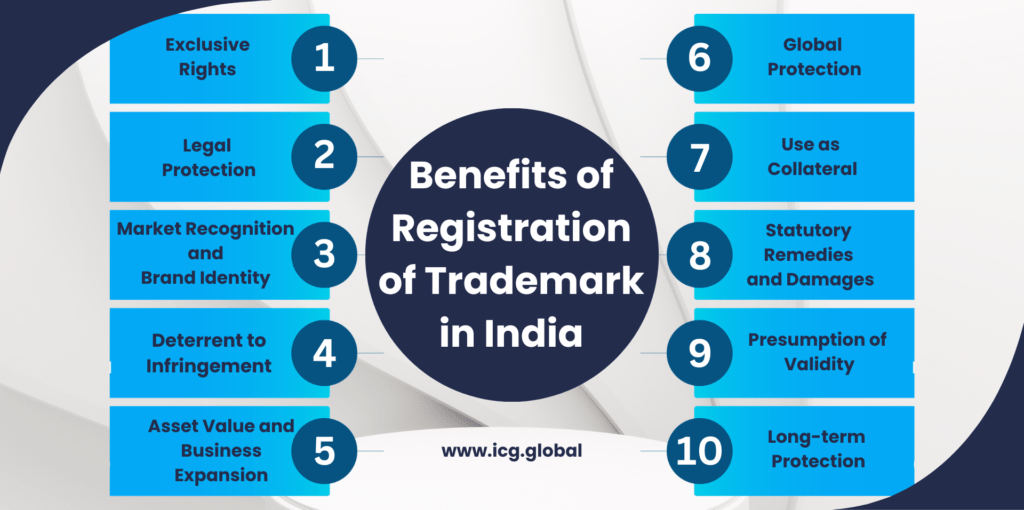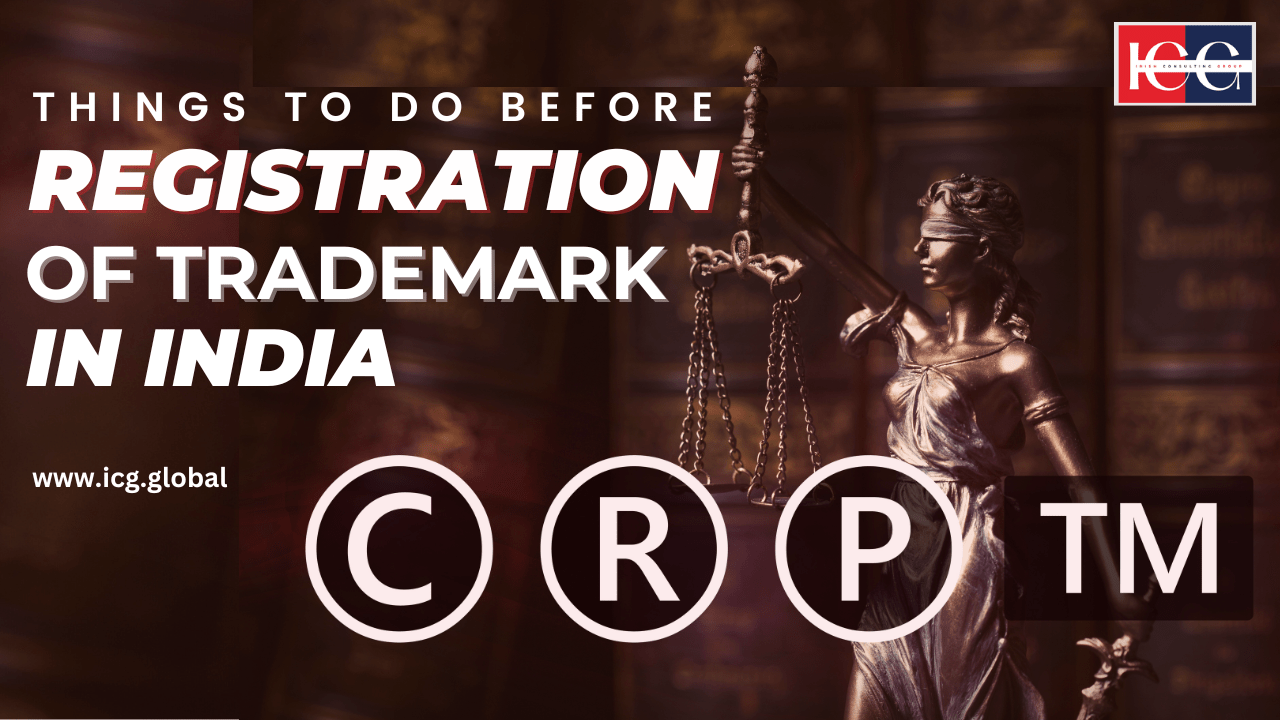10 Things To Do Before Registration of Trademark in India
Registration Of Trademark In India
The registration of trademark in India is a pivotal legal process that grants exclusive rights and protection to a distinctive sign, symbol, logo, or phrase used to identify goods or services in the market, while also managing trademark registration cost. It serves as a cornerstone for businesses and individuals aiming to establish a unique identity and safeguard their intellectual property assets.
The Initial Term Of Registration of Trademark In India
Initiating the registration process involves filing a comprehensive application with the Trademarks Registry, a governmental body operating under the Ministry of Commerce and Industry in India. This application serves as the foundation for establishing legal ownership and rights over the trademark.
Format of trademark registration in India:
Application Details:
The application submitted for trademark registration in India must contain essential details such as the trademark itself, a clear representation of its design or wording, a description of the goods or services it will represent, and the name and address of the applicant. This meticulous detailing ensures clarity and precision in the registration process.
Examination Process:
Upon filing, the registration of trademark in India application undergoes a rigorous examination by the Trademarks Registry to ensure compliance with the provisions outlined in the Trademarks Act, 1999. This examination encompasses scrutinizing the distinctiveness, uniqueness, and eligibility of the trademark for registration, along with considerations for trademark registration cost. Any discrepancies or objections raised during this phase necessitate prompt resolution to proceed further.
Publication and Opposition:
Upon successful completion of the examination, approved trademark applications are published in the Trademarks Journal for public scrutiny. This publication serves as a platform for interested parties to raise objections or oppositions to the registration within a stipulated period. Addressing any oppositions effectively is imperative to advance the registration process smoothly.
Certificate of Registration:
Following the publication period and resolution of any oppositions, if applicable, the registration of trademark in India is formally registered with the Trademarks Registry. A Certificate of Registration is then issued to the applicant, signifying the legal recognition and protection of their trademark rights. This certificate serves as tangible evidence of ownership and grants exclusive rights to use the trademark for the specified goods or services, while also reflecting trademark registration cost considerations.
Rights and Protection:
Registration of trademark in India bestows upon the owner a spectrum of exclusive rights, including the right to use the trademark in connection with the designated goods or services and the right to take legal action against any unauthorized use or infringement. This robust protection framework ensures the integrity, value, and longevity of the trademark in the marketplace, while also considering trademark registration cost.
What Should You Do Before Registration of Trademark in India?
Conduct a Trademark Search:
Before initiating the registration process, conduct a comprehensive trademark search to ensure that the proposed trademark is unique and does not infringe upon existing trademarks. This search can be conducted through the Trademarks Registry’s online database or by consulting with a trademark attorney.
Identify Goods or Services:
Clearly define the goods or services that the trademark will represent. This involves determining the specific categories or classes under which the goods or services fall, as per the classification system outlined by the Trademarks Registry.
Ensure Distinctiveness:
Verify that the proposed trademark is distinctive and capable of distinguishing your goods or services from those of others. Avoid using generic terms or descriptive phrases that lack distinctiveness, as they may be difficult to register.
Seek Legal Advice:
Consult with a qualified trademark attorney or legal advisor to understand the legal requirements and implications of registration of trademark in India. A legal expert can provide valuable guidance on the registration process, potential challenges, and strategies for protecting your trademark rights.
Prepare Trademark Application:
Gather all necessary information and documentation required for filing the trademark application, including details of the trademark, description of goods or services, and applicant information. Ensure that the application is accurately completed and adheres to the guidelines specified by the Trademarks Registry.
Consider Trademark Classes:
Identify the appropriate trademark classes or categories under which your goods or services fall. Classifying your trademark correctly is essential for ensuring adequate protection and avoiding potential conflicts with existing trademarks.
Review Trademark Specifications:
Carefully review the specifications of the trademark, including its design, wording, and graphical representation. Ensure that the trademark is presented in a clear and distinctive manner that aligns with the intended use and market positioning.
Assess Trademark Registration Fees:
Understand the applicable fees and costs associated with trademark registration in India. Familiarize yourself with the fee structure for filing the application, examination, publication, and issuance of the Certificate of Registration.
Maintain Records and Documentation:
Keep detailed records of all communications, documents, and transactions related to the trademark registration process. Maintain copies of the trademark application, correspondence with the Trademarks Registry, and any legal agreements or contracts pertaining to the registration of trademark in India.
Stay Informed:
Stay updated on developments and changes in trademark laws, regulations, and procedures in India. Subscribe to relevant newsletters, publications, or official announcements from the Trademarks Registry to remain informed about important updates and deadlines.
By completing these essential tasks and preparations before the registration of trademark in India, you can streamline the process, mitigate potential challenges, and ensure the successful protection of your intellectual property rights.
What is The Process of Trademark Registration in India
Trademark Search:
Conduct a thorough trademark search to ensure the availability and uniqueness of the proposed trademark. This can be done through the Trademarks Registry’s online database or with the assistance of a trademark attorney.
Trademark Application Filing:
Prepare and file the trademark application with the appropriate Trademarks Registry office. The application must include details such as the trademark itself, description of goods or services, and applicant information.
Application Examination:
The trademark application undergoes examination by the Trademarks Registry to assess compliance with legal requirements, including distinctiveness and eligibility for registration.
Publication in Trademarks Journal:
If the trademark application passes examination, it is published in the Trademarks Journal for public scrutiny. This publication allows interested parties to file oppositions against the registration within a specified period.
Opposition Proceedings:
If oppositions are filed against the trademark registration, proceedings may be initiated to resolve the objections raised. Both parties have an opportunity to present their arguments and evidence before a decision is made.
Registration Certificate Issuance:
If there are no oppositions or they are successfully resolved, the trademark is registered, and a Certificate of Registration is issued by the Trademarks Registry. This certificate serves as legal proof of trademark ownership and rights.
Renewal of Registration:
Trademark registrations in India are valid for an initial period of ten years from the date of registration. To maintain the registration, renewal applications must be filed with the Trademarks Registry before the expiration of the validity period.
Enforcement and Protection:
Once registered, the trademark owner has exclusive rights to use the trademark for the specified goods or services. Any unauthorized use or infringement of the trademark can be legally challenged and enforced through legal proceedings.
Record Keeping:
Maintain detailed records of all communications, documents, and transactions related to the trademark registration process. This includes copies of the trademark application, examination reports, publication notices, and registration certificates.
Monitoring and Maintenance:
Regularly monitor the marketplace for any unauthorized use or infringement of the registered trademark. Take necessary steps to enforce trademark rights and ensure continued protection and maintenance of the trademark registration.
By following these steps for the registration of trademark in India, individuals and businesses can navigate the process effectively and secure legal protection for their valuable intellectual property assets.
Benefits of Registration of trademark in India

Registering a trademark in India offers a multitude of advantages and protections for businesses and individuals seeking to establish and protect their brand identity and intellectual property assets. Here are the key benefits:
Exclusive Rights:
Registration of trademark in India grants the owner exclusive rights to use the trademark for the specified goods or services. This legal recognition provides a competitive advantage by preventing others from using or imitating the trademark without authorization.
Legal Protection:
Registrations of trademark in India afford legal protection against unauthorized use, infringement, and counterfeiting of the trademark. Trademark owners can take legal action against infringers to enforce their rights and seek remedies such as injunctions, damages, and seizure of counterfeit goods.
Market Recognition and Brand Identity:
A registered trademark enhances brand visibility, recognition, and credibility in the marketplace. It serves as a powerful tool for building brand loyalty, trust, and reputation among consumers, leading to increased sales and market share.
Deterrent to Infringement:
The mere registration of trademark in India acts as a deterrent to potential infringers and copycats. It signals to competitors and third parties that the trademark is legally protected and that unauthorized use will be met with legal consequences.
Asset Value and Business Expansion:
A registered trademark is a valuable intangible asset that can increase the overall value of a business. It enhances the attractiveness of the brand to investors, lenders, and potential buyers, facilitating business expansion, franchising, and licensing opportunities.
Global Protection:
Registration of trademark in India provides a basis for seeking protection in other countries through international treaties and agreements. Trademark owners can leverage their Indian registration to secure trademark rights in foreign markets, enhancing global brand presence and competitiveness.
Use as Collateral:
Registered trademarks can be used as collateral for securing financing or loans from financial institutions. Lenders perceive registered trademarks as valuable assets with tangible market value, providing additional security for borrowing purposes.
Statutory Remedies and Damages:
Registered trademark owners are entitled to statutory remedies and damages in case of infringement. They can seek legal recourse through civil litigation or administrative proceedings to enforce their rights and recover damages, including profits earned by infringers.
Presumption of Validity:
A registered trademark enjoys a presumption of validity and ownership, making it easier to assert and defend against challenges to its validity. This presumption simplifies legal proceedings and strengthens the trademark owner’s position in disputes with third parties.
Long-term Protection:
A registered Indian trademark is valid for ten years, renewable indefinitely. Regular renewal ensures ongoing protection.
Trademark registration offers businesses exclusive rights, legal protection, market recognition, and increased asset value. It’s a crucial step for building and safeguarding brand identity and intellectual property.
Summary
The registration of trademark in India is a critical process that grants exclusive rights and protection to a distinctive sign, symbol, or phrase used to identify goods or services. Before initiating the registration process, it is essential to conduct a thorough trademark search, define the goods or services, ensure distinctiveness, and seek legal advice to manage trademark registration cost effectively.
To register a trademark, you must file an application, undergo examination, and publication, culminating in a certificate. While navigating this process, it’s crucial to consider trademark registration cost alongside other factors.
Once registered, the trademark owner gains exclusive rights, legal protection, and market recognition, serving as a valuable asset for business expansion. The initial investment in trademark registration proves worthwhile, considering the long-term benefits it offers.
Overall, the registration of trademark in India offers numerous benefits, including exclusive rights, legal protection, market recognition, and asset value, making it indispensable for safeguarding brand identity and intellectual property assets while being mindful of trademark registration cost.
Follow us on LinkedIn for industry insights and company news: https://www.linkedin.com/company/irish-consulting-group/.
For any queries contact us: https://icg.global/contact-us/

